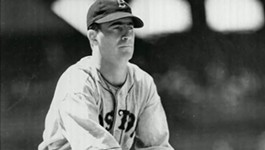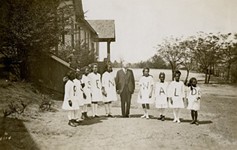The Life and Times of Hank Greenberg
1998, NR, 95 min. Directed by Aviva Kempner.
REVIEWED By Marc Savlov, Fri., Aug. 18, 2000

I originally caught this top-drawer example of the art of the documentary film at SXSW two years ago and immediately began telling anyone who would listen to go see it. After all, everyone's heard of Sandy Koufax, the great Dodgers pitcher who was also Jewish. But the earlier, and perhaps more historically noteworthy, successes of Detroit Tiger Hank Greenberg are today not common knowledge outside of fans of the sport. To whit, Greenberg was the first Jewish ballplayer to not mask his religious identity, playing first base and outfield for the Tigers from 1933 to 1946 and then for the Pittsburgh Pirates in 1947. During his years with the Tigers, Greenberg, a looming (6'4”), ruggedly handsome man with “wrists the size of most people's forearms,” missed tying Babe Ruth's home-run record by a crushing two runs, was chosen American League MVP two years running, and in 1965 was inducted in the Baseball Hall of Fame in Cooperstown, New York. You don't have to be a fan of the sport to appreciate Kempner's vivid, exhaustively researched film, or Greenberg himself, however. The Life and Times of Hank Greenberg is less about baseball than it is about the American Jewish experience in the Thirties and Forties, a time of upheaval for Jews the world over. In the U.S., up to that point, Jewish ballplayers had tended to alter their surnames to avoid anti-Semitism on and off the field. Greenberg, coming from an Orthodox Bronx-bred background, refused to change his name and became the first openly Jewish player in the American League. Kempner's film uses archival footage of the Tigers (and the several World Series they were involved in -- though they didn't actually clinch it until 1935), interviews with Greenberg, his family, fans, and friends like Walter Matthau, to paint a story of moral and physical character that only serves to underscore the ghastly state of professional sports today. Then, as now, major sporting figures were held up as role models, though you'd have been hard-pressed to find anybody in the mid-Thirties publicly claiming, “I am not a role model,” as certain current athletes have done. Times have changed, sure, but Greenberg's lanky nobility in the face of unrepentant anti-Semitism comes off as downright saintly. During WWII Greenberg was one of the first to enlist in the Army (though they used him mostly for morale-boosting purposes); he was discharged a short time before Pearl Harbor and soon found himself back in the olive drabs, flying a B-24 over Burma in the Pacific Theatre. Post-WWII, Goldberg was unceremoniously traded to the Pirates (the reasoning behind this is still a mystery) where, ironically, he played along newcomer Jackie Robinson, who had broken the color barrier in 1947 with the Brooklyn Dodgers. As a Jew, Greenberg made a point to help out the still-embattled Robinson whenever he could, knowing all too well that racial politics still divided the game. In his later years, “Hammerin' Hankus Pankus” married and fell into both the stock market and tennis, two consuming passions that all but drove baseball from his mind. Kempner's documentary is a streamlined, gorgeous piece of work, full of revelations of time, place, and person; to her credit she makes this 95-minute film seem like a Dizzy Dean fastball rocketing past Ken Burns' plodding Baseball. Clearly, they don't make 'em like they used to.
A note to readers: Bold and uncensored, The Austin Chronicle has been Austin’s independent news source for over 40 years, expressing the community’s political and environmental concerns and supporting its active cultural scene. Now more than ever, we need your support to continue supplying Austin with independent, free press. If real news is important to you, please consider making a donation of $5, $10 or whatever you can afford, to help keep our journalism on stands.
Marjorie Baumgarten, July 19, 2019
Marc Savlov, Oct. 9, 2015
Aug. 7, 2022
April 29, 2022
The Life and Times of Hank Greenberg, Aviva Kempner









